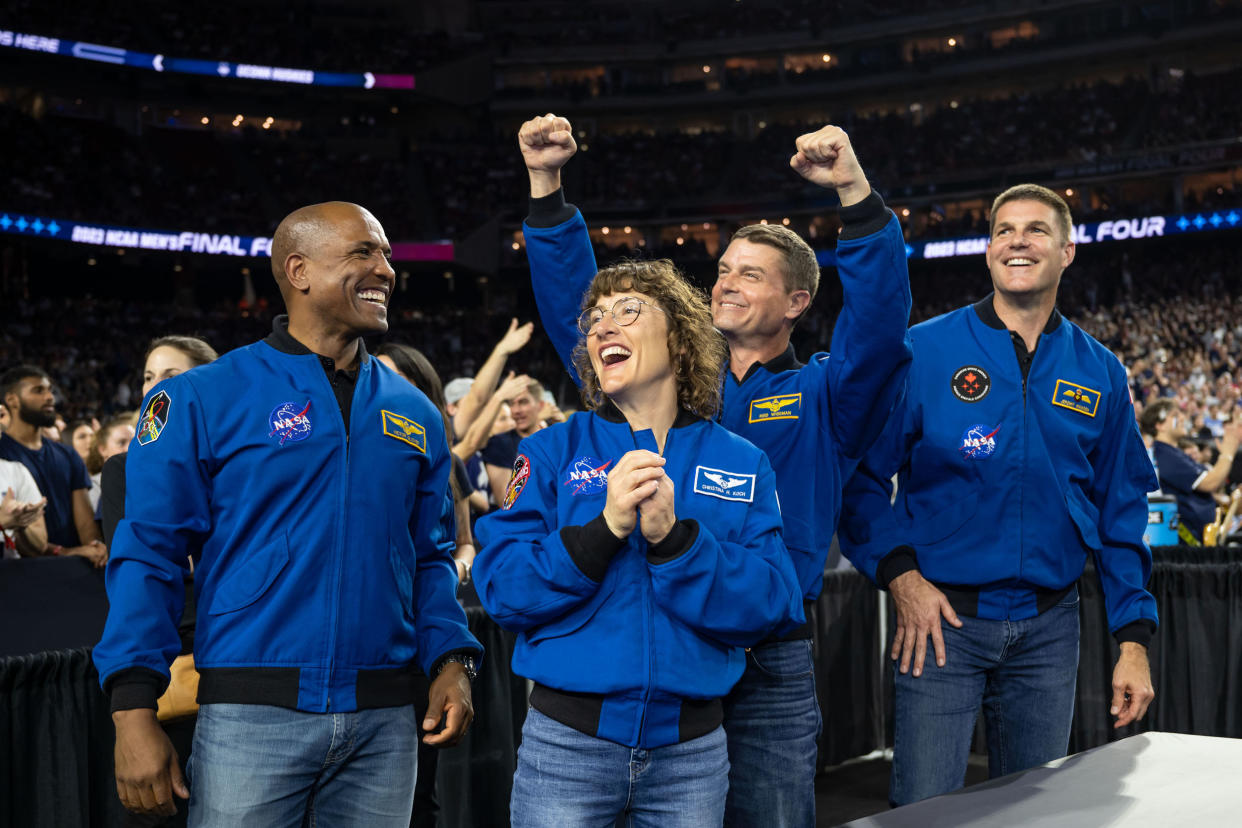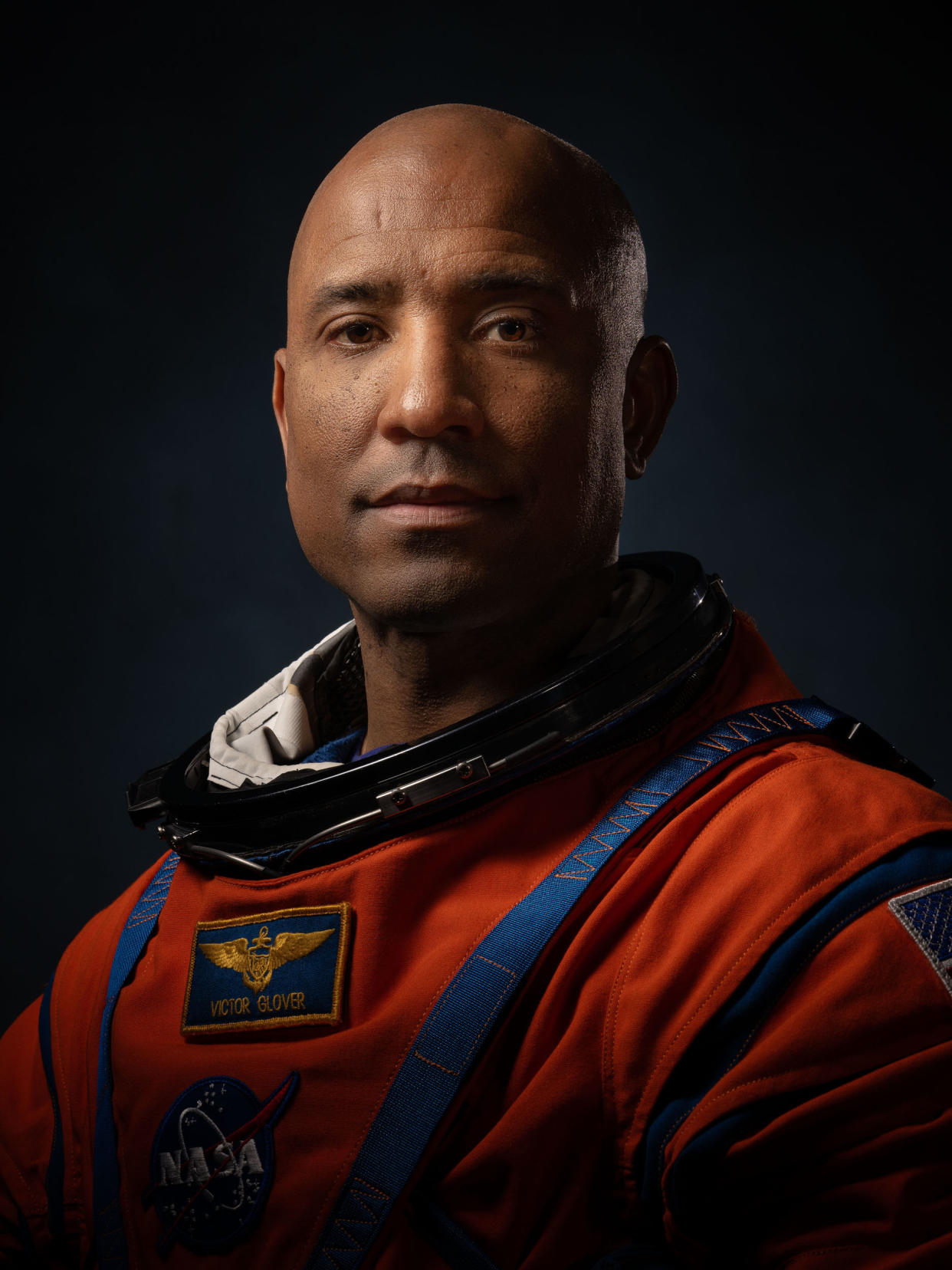Black astronaut says lunar mission will be 'major accomplishment' in American history
Throughout his career in the Navy, pilot Victor Glover has taken part in many exhilarating missions, but his next one will dwarf them all — he will be flying in outer space.
As a naval pilot for 26 years, Glover traveled extensively around the world before joining NASA in 2013. Now he is preparing to go beyond and become the first Black American astronaut assigned to a lunar mission. In November 2024, the 47-year-old will fly to the moon as a member of the Artemis II, which will also include the first woman going to the moon. They will travel aboard the Orion spacecraft for approximately 10 days around the moon.
One unique aspect Glover looks forward to, he said, is flying the spaceship by hand and spending 10 days with his crew.
“To see the Earth from the vantage point of the moon with that crew is going to be pretty special,” Glover said.
Glover spoke to NBC News about preparing for this historic mission, potential challenges his crew may face and the impact diversity has in space exploration. This interview has been edited for length and clarity.
NBC News: Artemis II is the first moon mission since 1972. How has the training process changed for a mission to the moon in 2023 versus back then in 1972?
Glover: There are flight controllers from 23 or more nations, what we call the Artemis Accords, that are agreeing to peacefully explore the solar system and the moon. But the basics are very similar: learning about the spaceship, learning about the mission and the trajectory, knowing what the crew can affect, what the crew can do — crew controls and then knowing the backup systems and knowing how to get out of challenging situations, and then working with the team that’s going to fly the mission from the ground.
This mission is very similar to the Apollo 8 mission. The difference is this crew is made up of an international partnership between the U.S. and Canada. And our Artemis missions will continue to be an international partnership, as well as a public-private partnership. Partnership is going to be an increasing part of how we explore space, the moon and eventually onto Mars for the foreseeable future.

NBC News: Are there any risks that the crew is concerned with for this upcoming mission? If so, what is your crew doing to prepare for potential challenges?
Glover: Human spaceflight is dangerous. It is risky. We put a lot of time in trying to understand that risk. We don’t talk about the risks enough. So, that can make it seem jarring when something goes wrong. When it launches, [the rocket] will weigh five and a half million pounds. It’ll produce eight and a half million pounds of thrust. It’ll be controlled, but that’s enough to rip apart most things that are made by human hands. Human spaceflight is inherently about trust and teamwork. Every single person needs to know how important what they’re doing is.
We’re also going to go out and meet those people that are putting together every single piece, because every screw, every wire, every weld, can impact our lives. We do what we can to learn about those risks and minimize or avoid them where we can. But at the end of the day, there are things that we can’t control. So, when we are faced with something that we don’t understand, we fall back on those fundamentals of the training and on the science and engineering that we use to build the vehicles to try to address the problem like Apollo 13 — one of the most amazing challenges that we overcame in real time while the public was watching.
NBC News: How are you preparing yourself mentally and physically for this mission?
Glover: The training is a piece of it. That practice gives you an emotional preparation. If things start to go wrong, you’ve seen something like it before. Definitely before I go fly in a spacecraft, I also will pray. And that’s a part of how I prepare my family. My family knows I’m going to work hard and work with this crew, and we’re going to do our best. But they also are aware that there are things outside of our control. And so it’s nice to know that we can pray and go to God and put our concerns out there and know that they’ll be heard by someone. So, we pray as a family and we step out on faith.
NBC News: You will be the first Black man in this historic space crew participating in a moon mission in NASA’s 60-year history. Is there more room for diversity in space and if so, what impact would this have on space exploration?
Glover: We know that when designing or developing something, having diverse perspectives and an engaged team working on things is the best way to get a product developed or improved. Diversity isn’t just about having more skin shades or more genders. It’s about bringing in the talent of the whole team. Our country is wonderfully diverse and that’s what has made America such a resilient and robust country and economy and civilization and society. So, the fact that our astronaut corps now, instead of looking like one slice of our society, it looks like our society — that is a sign of improvement, but also a reminder that we have to continue to do that kind of work and be intentional about that. I’m honored to be in this position but also this position is so much smaller than what’s really happening at large. This mission is the next major moonshot, the next major accomplishment in our American story. When we can explore by all people, for all people, it helps everyone to feel they’re connected to that story — and that, to me, is big.

NBC News: In an interview with Axios, you mentioned discussing “Whitey on the Moon,” a poem by Gilbert Scott-Heron, with your colleagues. What discussions have you had about race with your team? And do you see your role in space exploration as a symbol of progress in combating racism in America?
Glover: “Whitey on the Moon,” written [around] the time where we were dealing with civil rights movements, protests, the Vietnam War — there was a lot going on in the 1960s and 70s. I bring that up as a symbol of this idea that I do outreach to tell the story of NASA out to the public because we’re stewards of the public’s resources. But I also do outreach inside of NASA, because we represent our country. If you take my class’ picture — the eight of us that were selected — and you put it next to the next smallest class, the original Mercury Seven, they chose the same [type of] person seven times. It was seven, white, male, military, English-speaking test pilot Christians, that were the same height, weight, roughly. I mean, they were all about 37 years old. And so my class was four men, four women, racially, gender diverse, different backgrounds, scientists, engineers, military officers, and some pilots. So, it’s a sign of progress. We should continually take steps forward.
NBC News: What discoveries does the crew hope to make while on this mission and what impact will this information have on society and space exploration in the future?
Glover: We want to make sure that Orion is safe for people to fly. If Orion is safe for people to fly, then we get people to the surface of the moon and onto the Gateway space station, where we can learn more about deep space, where we can learn more about our moon. Some scientists would call the moon the eighth continent of the earth. So, by learning about the moon, we learn how we got here and potentially where we’re going. If we don’t take care of this planet, we could potentially end up looking like the moon or Mars.
